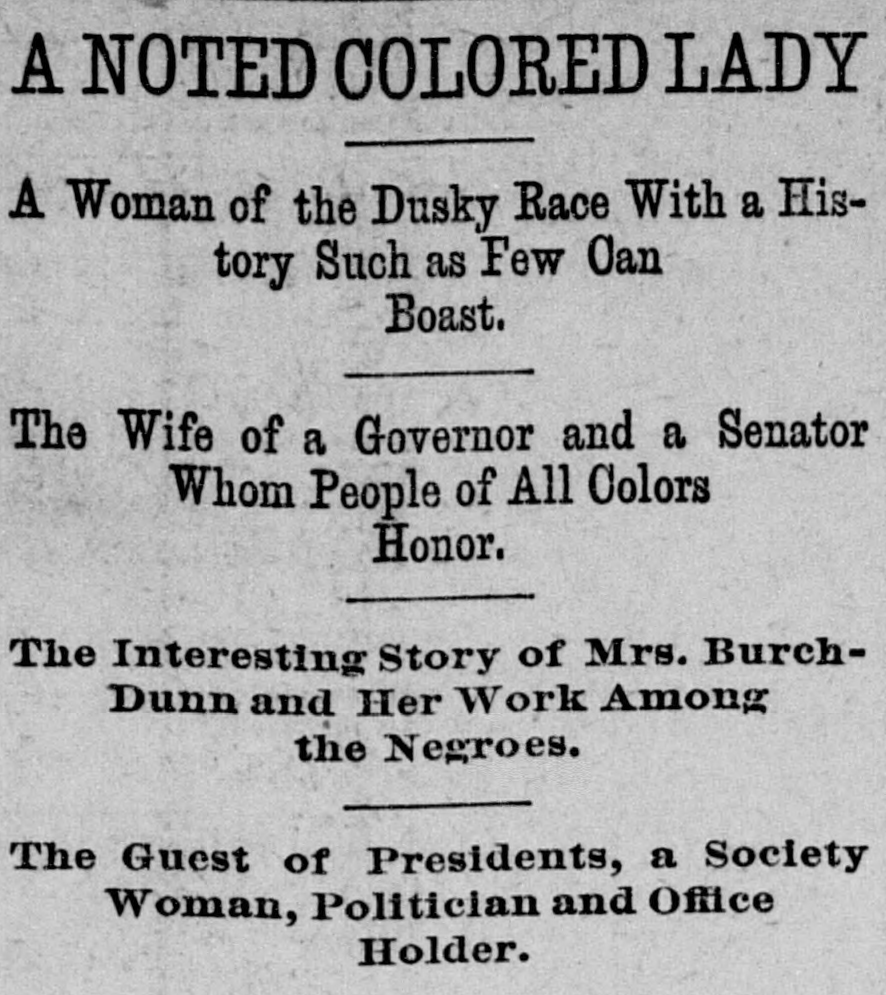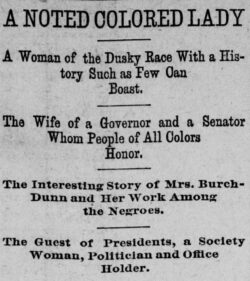Ellen Dunn-Burch
Ellen Dunn-Burch was a politically engaged philanthropist credited with convincing her husband Oscar J. Dunn to accept the nomination for lieutenant governor of Louisiana, making him the nation’s first Black executive officer.

Library of Congress
The headline for a newspaper interview with Ellen Burch-Dunn, St. Paul Daily Globe, June 14, 1885.
Ellen Dunn-Burch (1826–1885) was a Black philanthropist and archivist who was engaged in both local and national politics and served as an informal adviser to presidents and senators. Her family also led the movement to desegregate public schools in Louisiana by being the first to enroll their children at a newly integrated school. She was married to the nation’s first Black executive officer, Oscar James Dunn, and later to noted Black legislator James Henri Burch.
Born in 1826 in Cincinnati, Ohio, Ellen Boyd was the daughter of Henry Boyd, noted Black entrepreneur and inventor of the “Boyd Bedstead,” and Keziah Boyd. On May 7, 1842, she married Peter Marchand, and shortly thereafter the couple moved to New Orleans. In New Orleans, she first became acquainted with Oscar James Dunn when he moved into the Marchands’ home as a boarder in 1848, where he remained until 1860. Shortly after Dunn moved out, Ellen was widowed. The pair became reacquainted in 1865, and on December 27, 1866, they were married in New Orleans at St. James AME Church. Later, Oscar legally adopted Ellen’s three children (Fanny, Emma—also called Lizzie—and Charles), giving them his last name.
Noted Black orator and political leader John Mercer Langston credited Ellen with convincing her reluctant husband to accept the nomination for lieutenant governor of Louisiana on the morning of January 16, 1868. According to Langston, he had walked up and down Canal Street the entire night with Oscar Dunn, pleading with him to accept the nomination. Langston maintained that he made his final appeal to Oscar on the Dunns’ porch on at four o’clock in the morning. Hearing the loud discussion, Ellen exited the home to discover the two embroiled in debate. After learning of the substance of their conversation, Ellen replied, “My husband, you must do your duty,” and Dunn relented and stated that he would accept the nomination. Later that day, at the Republican Convention, Oscar officially accepted his party’s nomination for lieutenant governor.
Throughout her marriage to Oscar, Ellen remained closely involved with her husband’s social, political, and philanthropic concerns. As a couple, they were benefactors and board members of a Black orphans’ home, supported schools for recently emancipated freedmen, and placed themselves on the front lines of fighting for social change in the state.
One example of the couple’s willingness to support civil rights issues was their decision to allow their own daughters to be the first children to integrate Louisiana’s public school system. During the Christmas break of 1870, Ellen enrolled them at the previously all-white Madison Girls’ School located at Palmyra and Prieur Streets, paving the way for other Black parents who had been hesitant to risk violent reprisals.
Ellen also played an active role in fundraising efforts in New Orleans’s Black community and was often called upon to sing at benefits and concerts. She was sometimes accompanied in these volunteer efforts by State Legislator James Henri Burch, a close friend and political ally of the Dunns. On November 22, 1871, Lieutenant Governor Oscar James Dunn died under mysterious circumstances, and Ellen was widowed for a second time.
Oscar’s unexpected death left his family on the verge of financial ruin. His succession records show that his debts far outweighed his assets. In 1872 the city’s sheriff placed the family’s carriage and their stately home near the corner of Claiborne and Canal Streets on the auction block. When news of the family’s financial crisis circulated, Black and white Louisianans from both political parties organized efforts to secure the family’s home and to provide funds to support Ellen and her children. Frederick Douglass, the iconic anti-slavery orator and Black leader, joined the fundraising efforts and pledged to give a lecture in the late lieutenant governor’s honor, with the admission proceeds going to Ellen. A bank account was opened for donations to the family, and the legislature passed a bill securing $5,000 to purchase the home.
Realizing that the family would need continued financial support, New Orleans mayor Benjamin F. Flanders appointed Ellen as keeper of the city archives, a role that paid 150 dollars per month. In accepting the position, Ellen became not only the first archivist in New Orleans, but also both the first Black and the first female head archivist in the nation. Ellen later accepted a federal appointment as chief countress of the New Orleans Mint and worked as a teacher before marrying Burch on November 25, 1875.
Despite having remarried, Ellen did not give up Dunn’s surname. Instead, she adopted the hyphenated Dunn-Burch. By her own account, Ellen remained active in national politics, serving as an unofficial adviser lobbying on behalf of her people. She recalled that Frederick Douglass; Presidents Grant, Hayes, and Garfield; as well as Senators Conkling and Hoar all sought her counsel regarding the conditions of Black Americans in the South.
Following Burch’s death in 1885, Ellen decided to take an extended vacation touring several northern states. During the trip, Ellen became ill and died of heart disease on September 18, 1885, in Cincinnati, the place of her birth. Ellen Dunn-Burch was interred in Cincinnati’s Spring Grove Cemetery in a family plot.
